Front Case Half
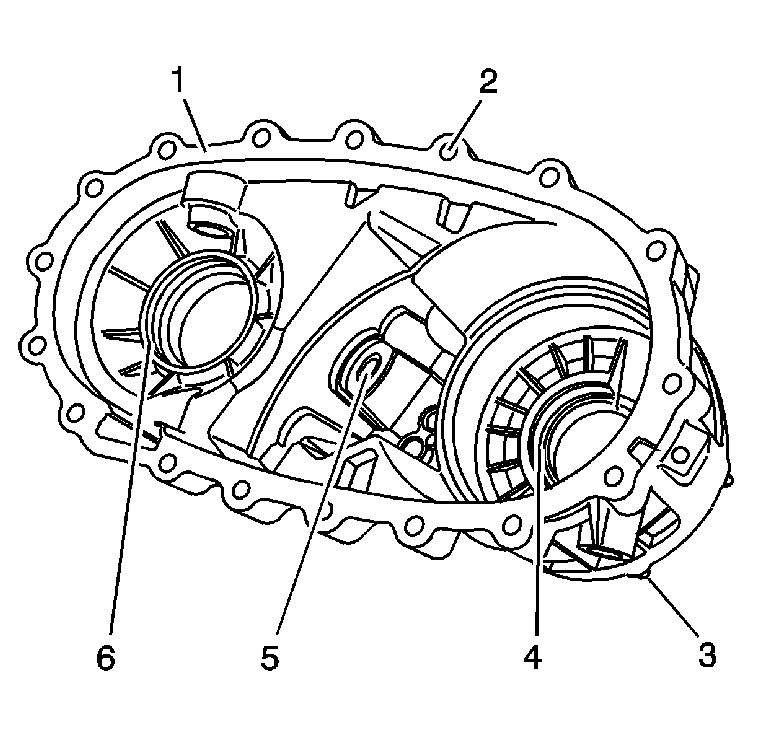
- Clean the front case half in cleaning
solvent and air dry.
Notice: Refer to Machined Surface Damage Notice in the Preface section.
- Remove the sealer from the case sealing surfaces.
- Inspect the case for being broken or cracked.
- Inspect the front output shaft front bearing bore (6) for
the following conditions:
- Inspect the input shaft bearing bore (4) for the following
conditions:
- Replace the front case half if any of the above conditions are
found.
- Inspect the sealing surfaces (1) for damage.
- Repair small scratches or nicks with a soft stone.
- Inspect the front case to transmission case mounting surface for
damage.
- Inspect the case threaded bolt holes (2) for damage.
- Repair any damaged threads.
- Inspect the transmission to transfer case studs (3) for
damage.
- Replace any damaged studs. Refer to
Transfer Case Assemble
.
- Inspect the control actuator lever shaft bearing and seal (5)
for the following conditions :
- Replace the control actuator lever shaft bearing if faulty.
Refer to
Transfer Case Disassemble
and
Transfer Case Assemble
.
- Inspect the location pins for being loose or missing.
- Repair or replace any damaged location pins.
- Inspect the front output shaft front bearing and the input shaft
bearing for the following conditions:
- Replace the bearings if any of the above conditions are found.
Refer to
Transfer Case Disassemble
and
Transfer Case Assemble
.
Rear Case Half
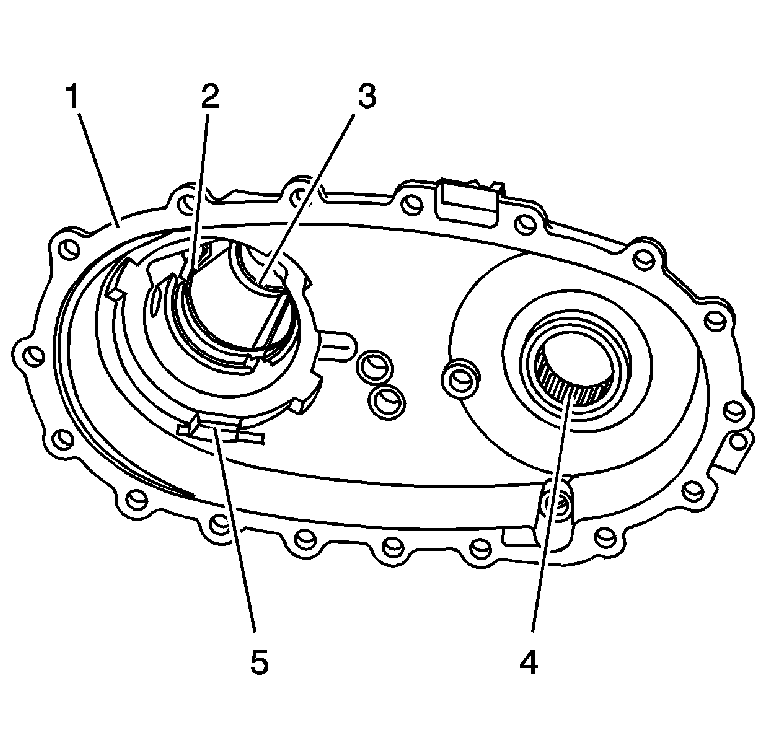
- Clean the rear case half in cleaning
solvent and air dry.
Notice: Refer to Machined Surface Damage Notice in the Preface section.
- Remove the sealer from the case sealing surfaces.
- Inspect the case for being broken or cracked.
- Replace the case if broken or cracked.
- Inspect the sealing surfaces (1) for damage.
- Repair small scratches or nicks with a soft stone.
- Inspect the case threaded bolt holes for damage.
- Repair any damaged threads.
- Inspect the oil pump wear sleeve (5) for wear or damage.
- Replace the oil pump wear sleeve if faulty.
- Inspect the front output shaft rear bearing (4) for the
following conditions:
- Replace the front output shaft rear bearing if any of the above
conditions are found. Refer to
Transfer Case Disassemble
and
Transfer Case Assemble
.
- Inspect the rear output shaft bearing for the following conditions:
- Inspect for a spun bearing bore for the rear output shaft rear
bearing.
- Replace the case if a bearing has spun.
- Inspect the rear output shaft rear bearing retaining ring (2)
for being bent or twisted.
- Replace a faulty retaining ring.
- Inspect the rear case bushing (3) for scoring or wear.
- Replace a faulty rear case bushing. Refer to
Transfer Case Disassemble
and
Transfer Case Assemble
.
Oil Pump, 1st Design
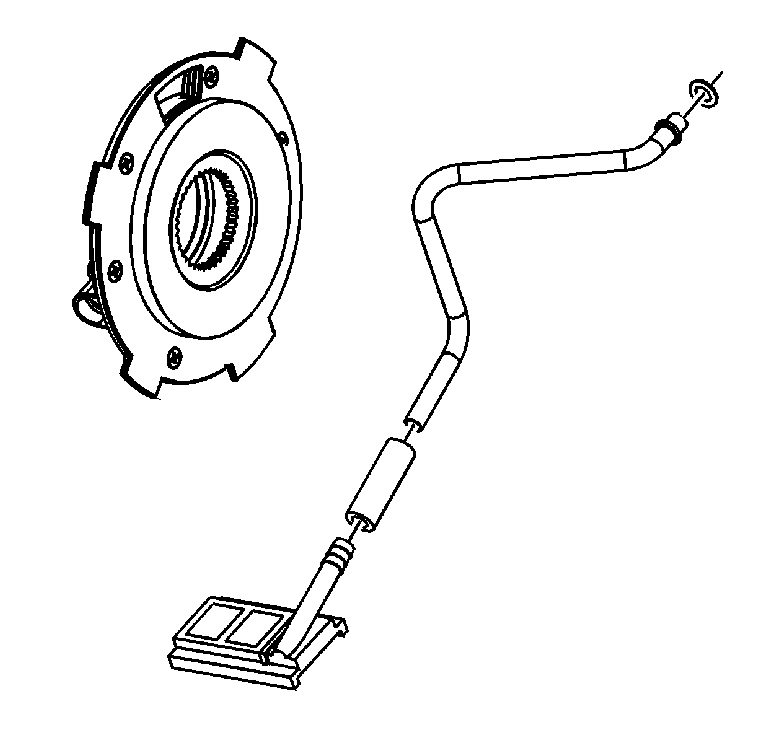
- Remove the oil pump suction pipe and
the connector hose from the oil pump screen.
- Clean the pipe, hose, and screen in cleaning solvent and air dry.
- If the screen is embedded with debris, replace the screen.
- Inspect the hose for cracking or tears.
- Replace the hose if faulty.
- Inspect the oil pump for free movement.
- Replace the oil pump if there is any binding. Do not disassemble
the oil pump. The oil pump is serviced as a unit.
Oil Pump, 2nd Design
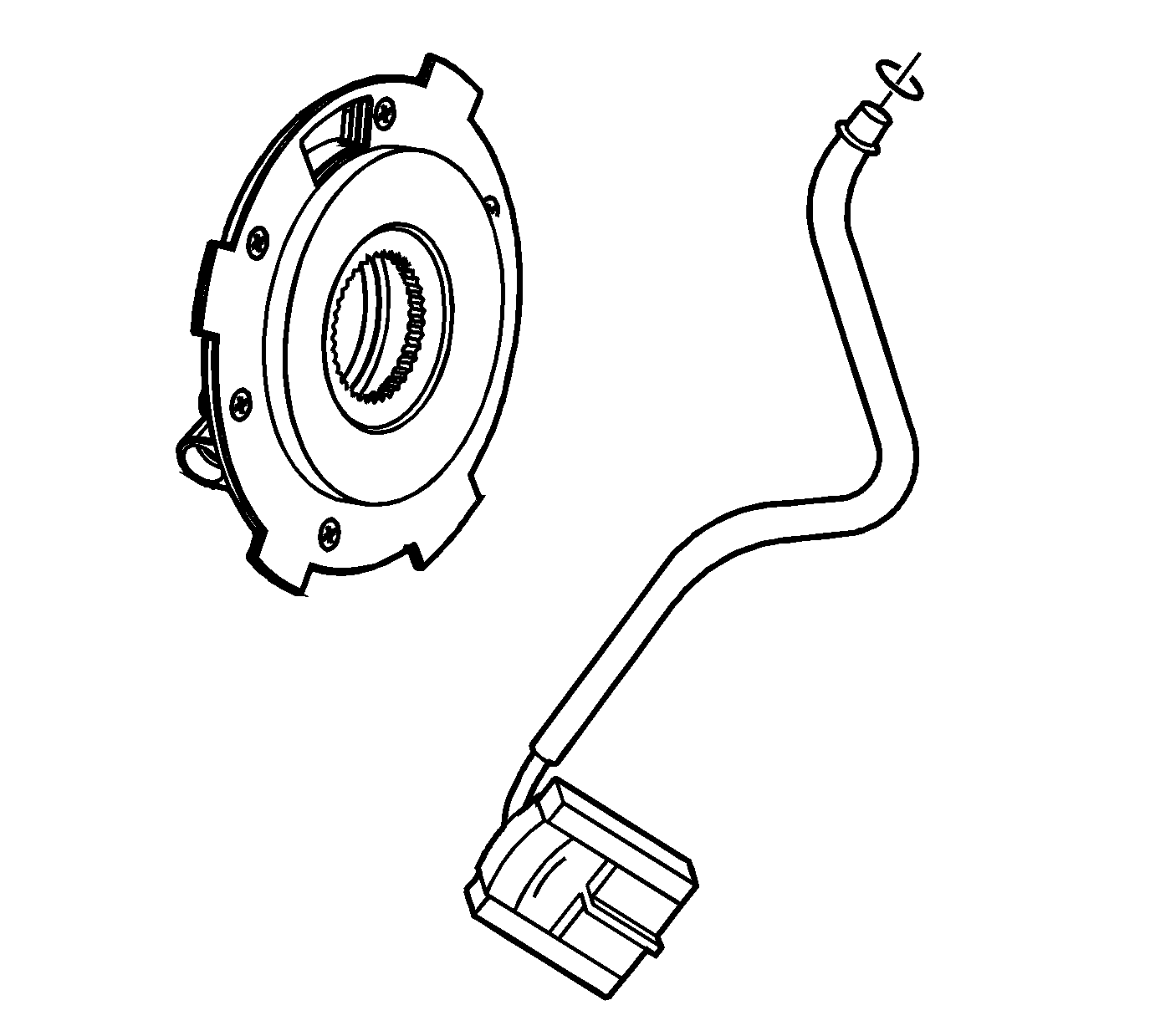
- Clean the oil pump suction pipe, with
the screen, in cleaning solvent and air dry. Do not remove the screen from
the pipe.
- If the screen is embedded with debris, replace the suction pipe
assembly.
- Inspect the oil pump for free movement.
- Replace the oil pump if there is any binding. Do not disassemble
the oil pump. The oil pump is serviced as a unit.
Rear Output Shaft
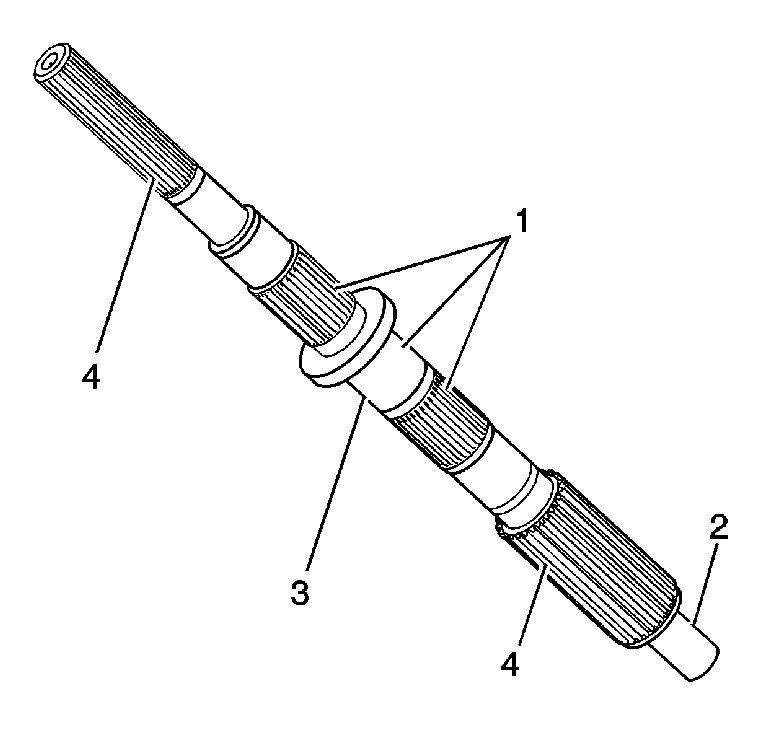
- Clean the rear output shaft in cleaning
solvent.
- Clean the rear output shaft oil galleries (1) and air
dry.
Important: Do not attempt to smooth any roughness on the bearing journals.
- Inspect the input gear pilot bearing surface (2) and the clutch
housing bearing surface (3) for the following conditions:
- Inspect the rear output shaft splines (4) for damage or
excessive wear. Witness marks at the location of the gears are normal.
- Replace the rear output shaft if any of the above conditions are
found.
Clutch Components
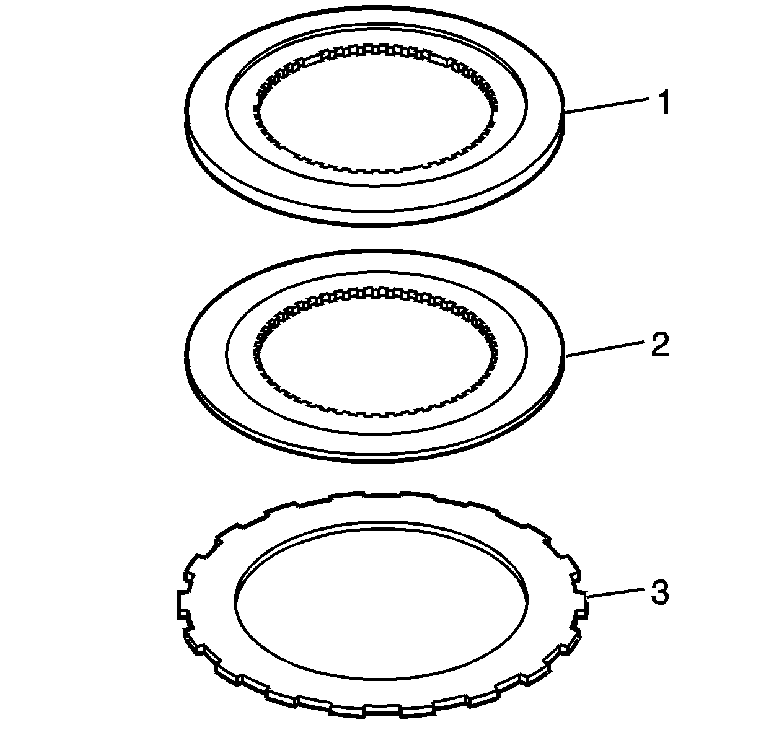
- Do not clean the inner clutch discs (2)
in cleaning solvent.
- Inspect the inner clutch discs (2), with the friction material,
for the following conditions:
| • | Grooved or scored friction material |
- Inspect the outer clutch discs (3) steel plates for being
grooved.
- Inspect the outer clutch discs for a wavey wear pattern.
- Replace the clutch discs if any of the above conditions are
found.
- If 1st design, inspect the clutch backing plate (1) for
wear.
- If 1st design, replace the clutch backing plate if worn.
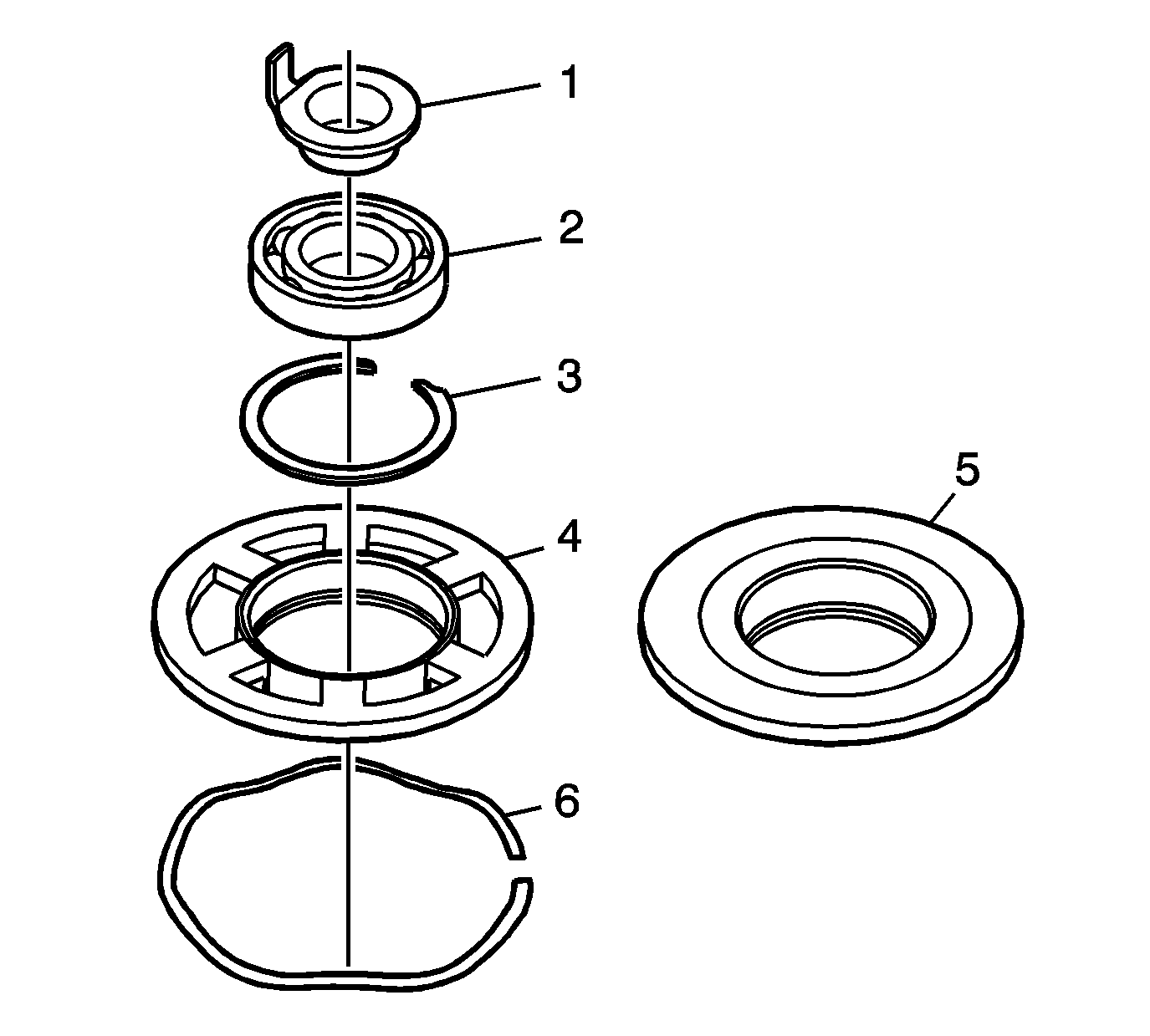
- Clean the clutch pressure plate (4
or 5), the clutch pressure plate bearing (2) and the clutch bearing
inner support (1) in cleaning solvent and air dry.
- Inspect the pressure plate bearing (2) for the following
conditions:
- Replace the pressure plate bearing if damaged or worn.
- Inspect the clutch pressure plate (4 or 5) for wear or
damage.
- Replace a faulty clutch pressure plate.
- Inspect the clutch pressure plate bearing hub (1) for wear
or damage.
- Replace a faulty clutch pressure plate bearing hub.
- Inspect for a damaged clutch spring (6).
- Replace a faulty clutch spring.
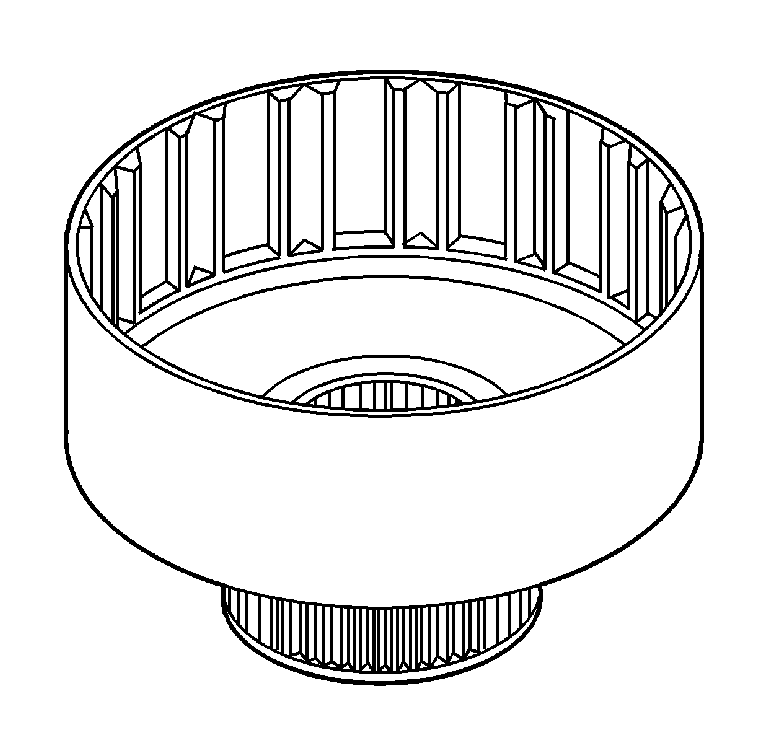
- Clean the clutch housing, with the
bearing, in cleaning solvent.
- Air dry and ensure all solvent is removed from the bearing.
- Inspect the bearing for wear or damage.
- Replace the clutch housing bearing if faulty. Refer to
Transfer Case Disassemble
and
Transfer Case Assemble
.
- Inspect the clutch housing disc teeth for excessive wear. Excessive
wear can be identified by the steps in the teeth, which prevents the clutch
disc from moving freely.
- Replace the clutch housing if the clutch disc teeth cannot be
deburred.
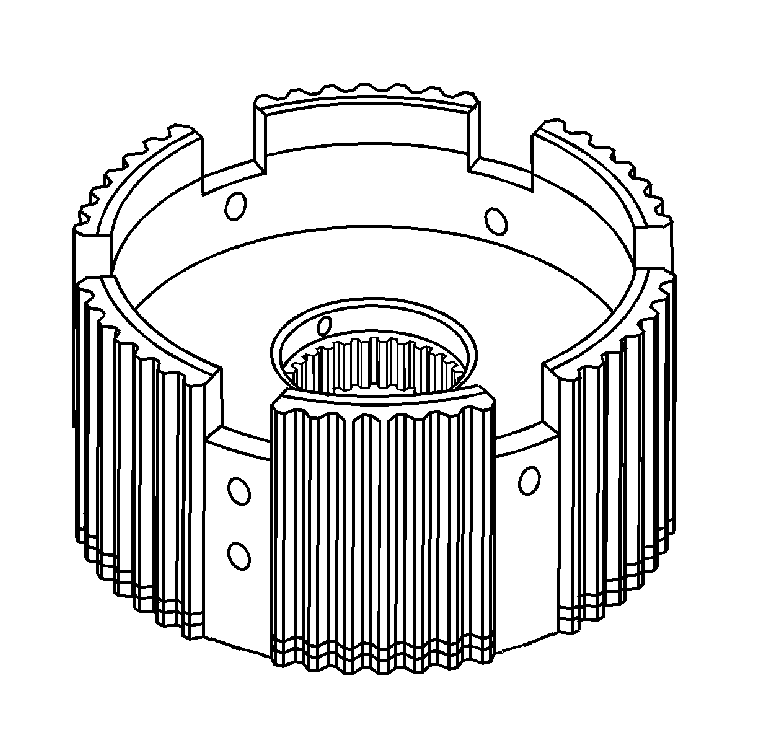
- Clean the clutch hub in cleaning solvent
and air dry.
- If 1st design, inspect the inner splines of the clutch hub for
wear or damage.
- If 1st design, inspect the rear output shaft to the clutch inner
hub splines for excessive looseness.
- If 1st design, inspect the clutch hub teeth for excessive wear.
Excessive wear can be identified by the steps in the teeth, which prevents
the clutch disc from moving freely.
- If 1st design, replace the clutch hub if any of the above conditions
are found.
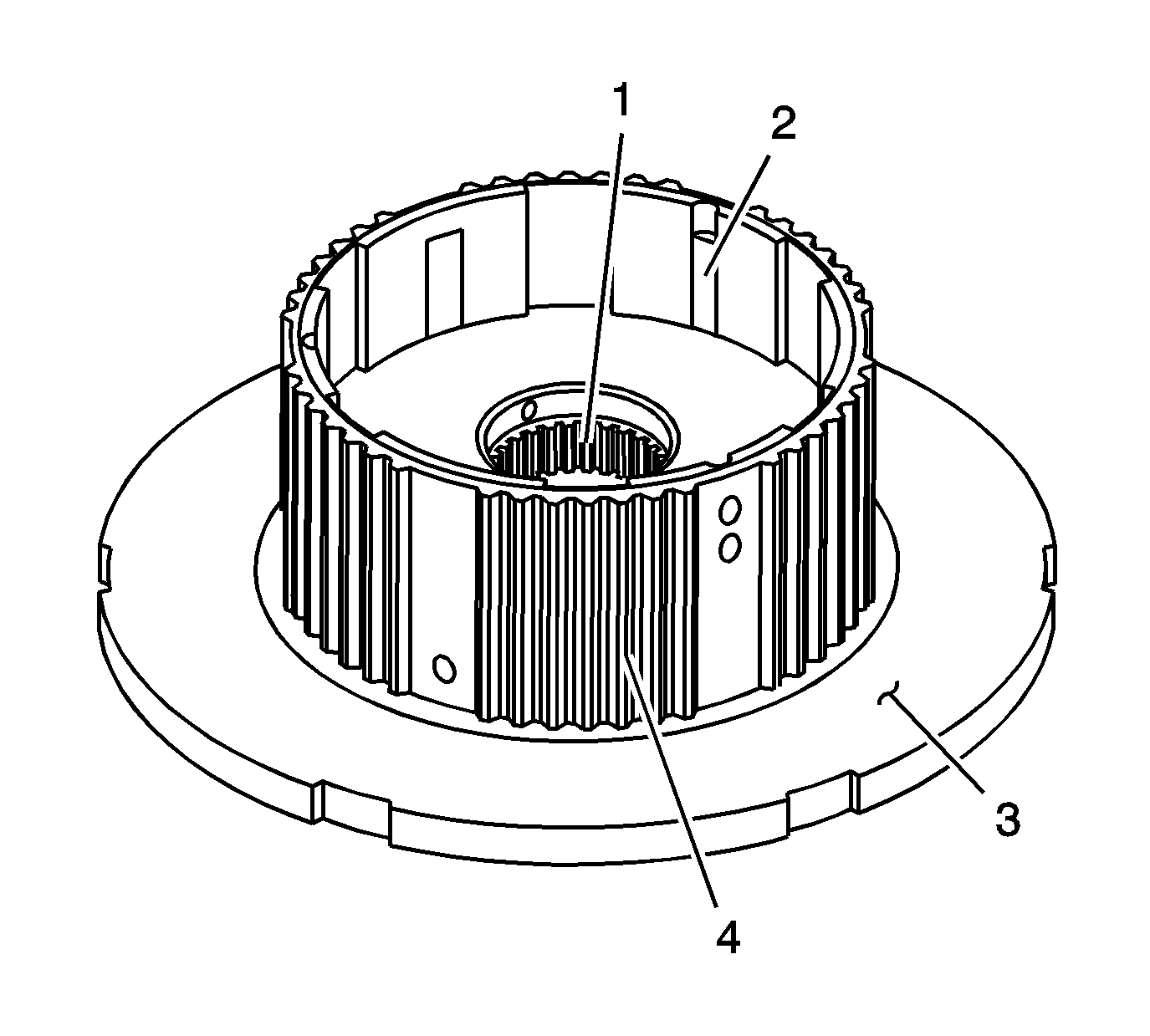
- If 2nd design, inspect the clutch disc
surface (3) for excessive wear, warpage, or grooves.
- If 2nd design, inspect the rear output shaft to the clutch inner
hub splines (1) for excessive looseness.
- If 2nd design, inspect the clutch hub teeth (4) for excessive
wear. Steps in the teeth can identify excessive wear, which prevents the clutch
disc from moving freely.
- If 2nd design, inspect the clutch pressure plate tab slots (2)
for excessive wear.
- Replace the clutch hub if any of the above conditions are found.
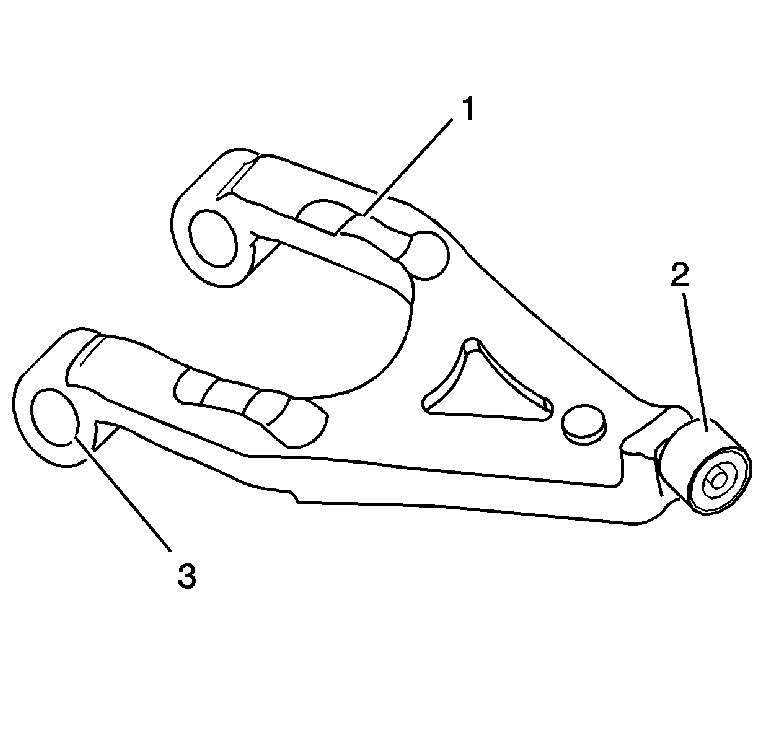
- Clean the clutch lever assembly in
cleaning solvent and air dry.
- Inspect the clutch lever roller (2) for the following
conditions:
- Inspect the clutch lever for worn wear pads (1).
- Inspect the clutch lever for wear at the pivot pin holes (3).
- Replace the clutch lever assembly if the above conditions are
found.
Drive Chain and Sprockets
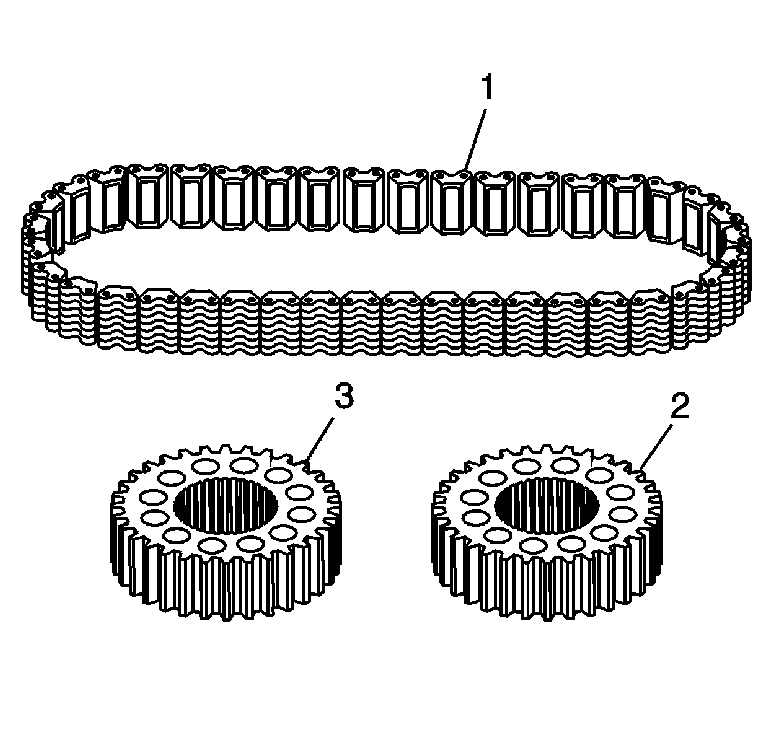
- Clean the drive chain (1), drive
sprocket (3), and driven sprocket (2) in cleaning solvent
and air dry.
- Inspect the drive chain (1) for the following conditions:
| • | Debris embedded in the links |
- Replace the chain if any of the above conditions are found.
- Inspect the driven sprocket (2) and the drive sprocket (3)
for the following conditions:
| • | Excessively worn gear surfaces |
| • | Slight wear marks are
normal. |
| • | Debris embedded in the root of the teeth |
- Replace the sprocket if any of the above conditions are found.
The chain and sprockets may be replaced separately.
Front Output Shaft
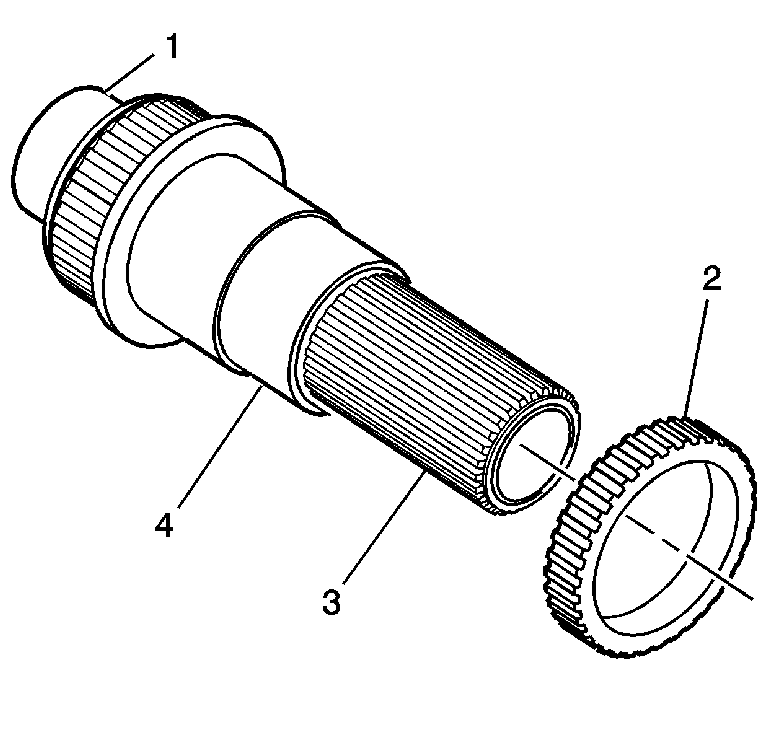
- Clean the front output shaft in cleaning
solvent and air dry.
- Inspect the teeth on the speed sensor reluctor wheel (2)
for damage.
- Replace the speed sensor reluctor wheel if damaged. Refer to
Transfer Case Disassemble
and
Transfer Case Assemble
.
- Inspect the front output shaft rear bearing race (1) for
the following conditions:
- Inspect the front output shaft splines (3) for damage.
- Inspect the front output shaft seal surface (4) for wear
or roughness.
- Replace the front output shaft if any of the above conditions
are found.
Input Gear
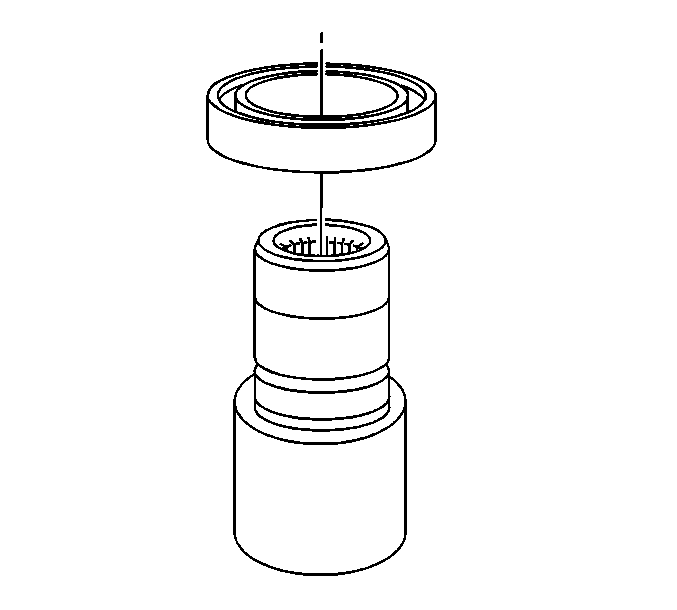
- Clean the input gear, with bearings,
in cleaning solvent.
- Air dry and ensure all solvent is removed from the bearings.
- Inspect the input gear bearing for the following conditions:
- Replace the input gear bearing if any of the above conditions
are found. Refer to
Transfer Case Disassemble
and
Transfer Case Assemble
.
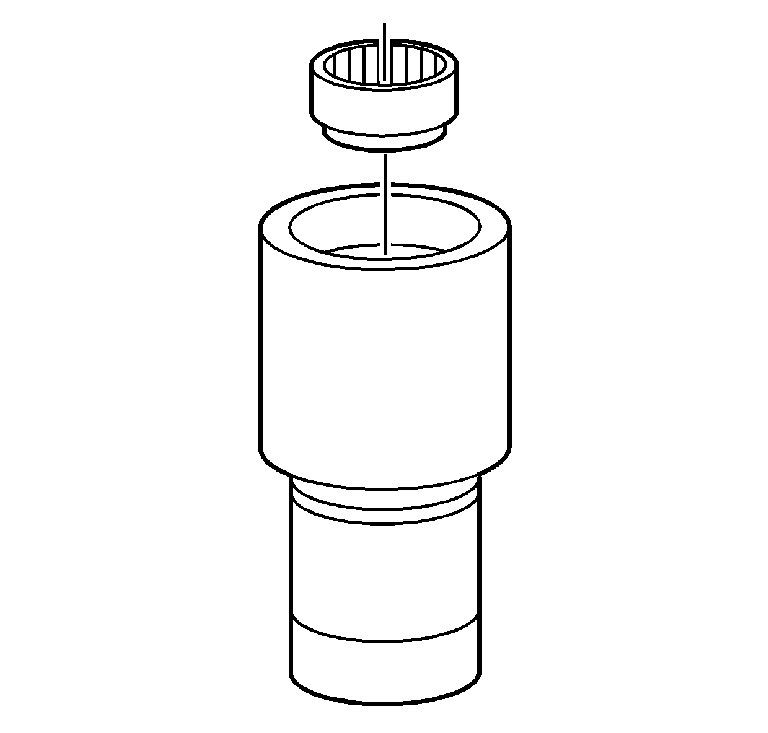
- Inspect the input gear pilot bearing
for the following conditions:
- Replace the input gear pilot bearing if any of the above conditions
are found. Refer to
Transfer Case Disassemble
and
Transfer Case Assemble
.
- Inspect the input gear seal surface for pitting or excessive
wear.
- Inspect the input gear internal splines for excessive wear.
- Replace the input gear if any of the above conditions are found.















